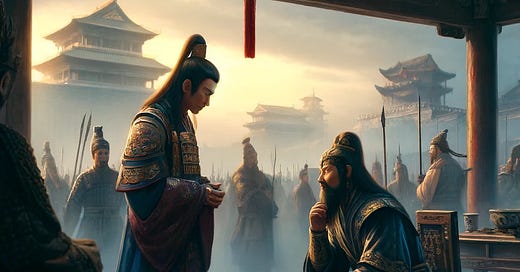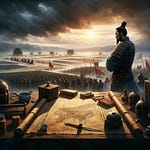The Moral Law ("Dao") causes the people to be in complete accord with their ruler, so that they will follow him regardless of their lives, undismayed by any danger.
In ancient Chinese, the meaning of "Dao" is complex, representing path, morality, reasoning, laws, and principles. In "The Art of War" by Sun Tzu, "Dao" has a clear and crucial meaning. It sets a standard for analyzing and comparing whether the rulers and generals of opposing sides can align the will of their soldiers and people with the leadership's intentions, achieving unity. This unity or lack thereof is a decisive factor in war and a primary concern in governance and military leadership. Thus, Sun Tzu prioritizes it in strategic analysis.
On the eve of the Chu-Han Contention (206 BC), during a conversation in Hanzhong county, Han Xing and Liu Bang focused on this crucial point. In 206 BC, Xiang Yu declared himself the Hegemon-King of Western Chu and appointed 18 feudal lords, sending his rival Liu Bang to the Bashu area, a place for exiling Qin dynasty criminals, and naming him the King of Han. He also positioned former Qin generals Zhang Han and Sima Xing nearby to restrict Liu Bang. Feeling frustrated, Liu Bang was determined to make a comeback. At this moment, fate introduced him to a unique talent—Han Xing. After some effort, Liu Bang appointed Han Xing as his chief general. After the appointment ceremony, Liu Bang eagerly sought advice from Han Xing, asking, "General, what strategy do you suggest for me?"
Han Xing asked, "Isn't Xiang Yu your rival in the quest for the empire?" Liu Bang replied, "Exactly, King Xiang." Han Xing then asked, "Considering courage in troops, kindness in treatment of people, and the extent of power, how do you compare yourself with Xiang Yu?" After a moment of silence, Liu Bang said, "I am inferior to King Xiang." Han Xing agreed, "Not just you, even I think you're no match for King Xiang. But I have served under King Xiang, please allow me to share my insights about him."
Han Xing first commented on Xiang Yu's bravery, saying, "A shout from King Xiang could make thousands tremble, but his inability to employ wise generals is mere brute courage." He also analyzed Xiang Yu's kindness: "King Xiang treated people with respect and gentleness, and would share his food with the sick, moved to tears by their suffering. However, when it came to rewarding his subordinates with titles, he hesitated to part with even a worn-out official seal, which is a kindness of the timid."
Han Xing then focused on analyzing Xiang Yu's power from four aspects: "Although King Xiang dominated all under heaven, making feudal lords submit, his first mistake was abandoning the strategically important Guanzhong area for Pengcheng county, which was in a flat terrain. His second mistake was breaking the pact with King Huai of Chu by appointing his favorites as kings, causing resentment among the feudal lords. His third mistake was exiling King Huai of Chu to the south, prompting other lords to follow suit, exiling their kings and declaring themselves as rulers. His fourth mistake was committing mass killings wherever he went, leading to widespread hatred towards him, with people only submitting under duress." Concluding his analysis, Han Xing said, "On the surface, Xiang Yu might seem like the leader of all, but in reality, he has lost the people's hearts, leading to the rapid decline of his power!" Hearing this, Liu Bang became visibly excited, leaning forward to the point where his knees touched the seat in front of him.
Han Xing analyzed Liu Bang's three advantages: "First, when you entered Wuguan Pass, you didn't harm a hair on anyone's head, abolished Qin's harsh laws, and established three simple laws with Qin's people, who all wish to support you as their king in Guanzhong area, truly winning the hearts of the people. Second, as per the agreement with the feudal lords, you were supposed to be king in Guanzhong, and the people there are aware of this. But you were made king in Hanzhong county instead, and the people of Qin bear resentment towards King Xiang, which is just. Third, now that you are marching east and attacking the territories of the Guanzhong area, you can easily reclaim them with just one command, showing you have a strong foundation of power."
Han Xing then encouraged Liu Bang: "Under these circumstances, if you do the opposite of what is expected, employing brave warriors from across the land, why worry about not defeating the enemy? Distributing lands to those who have rendered meritorious services, why worry about their loyalty? Leading courageous soldiers, eager to return to their homeland, why worry about not dispersing the enemy?"
Han Xing's advice essentially laid out a strategy for Liu Bang to conquer the realm by launching an eastern campaign. Liu Bang was overjoyed upon hearing this, regretting that he had not met Han Xing sooner. He followed Han Xing's advice closely, organizing his generals in preparation for the attack. Six months later, Liu Bang implemented Han Xing's strategy of "Openly repair the gallery roads, but sneak through the passage of Chencang” and led his troops out of Hanzhong county, swiftly capturing most of the Guanzhong area and achieving an initial victory over King Xiang.
Han Xing's speech focused on analyzing how Xiang Yu lost his way and the people's support, while Liu Bang found his way and received the people's deep support. Why did this confidence alone encourage Liu Bang to break out of Hanzhong county? Because Han Xing knew that “Dao” is a crucial source of power; with it, endless strength follows. As Sun Tzu further elaborated, achieving “Dao” means the army and the populace will follow you in life and death without deceit. "Deceit" here refers to trickery or doubt, and "without deceit" means the army and people will not betray their leaders at critical moments, showing unwavering loyalty.
Throughout history, it has always been easy to talk about fighting, swear oaths, and express loyalty during peaceful times. However, when war actually arrives, the situation can change drastically. Sun Tzu believed that only if there is unity between the leaders and the people during peacetime, can the army and civilians truly stand by their ruler and generals, share their fate, and face life and death together without flinching when war breaks out.










Share this post